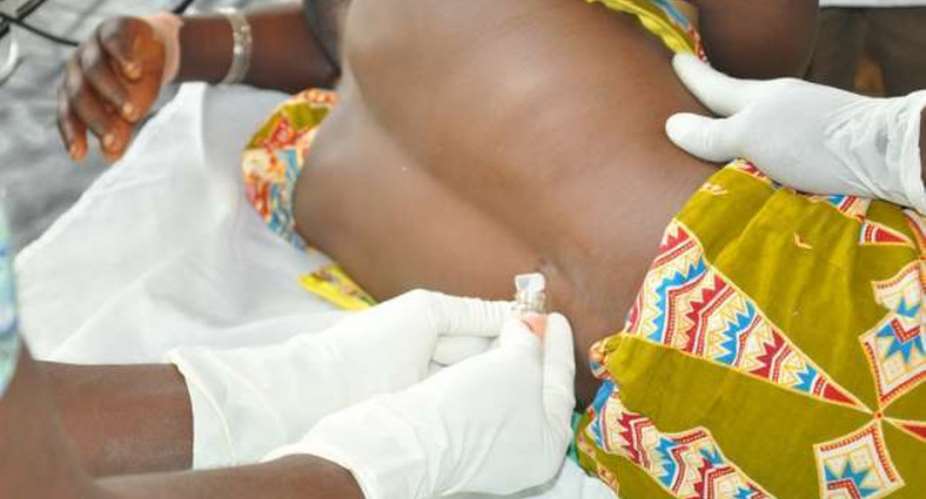About 48 people have died from Cerebrospinal Meningitis (CSM) disease in four regions of the north.
This is out of about 449 cases recorded in the Upper West, Upper East, the Northern Region and the Savannah Region.
The cases recorded in the past 14 weeks has seen the Upper West Region recording the highest number of 37 deaths out of 394 cases, followed by the Upper East Region with five deaths with 18 confirmed cases, the Northern has two deaths out of 27 cases, while the Savannah Region recorded seven deaths out of 40 cases.
The Upper West Regional Minister, Dr Hafiz Bin Salih, who has been addressing the issue in a public broadcast in Wa, said the fatalities had been increasing, especially in the last three weeks, progressing from 18 in week 10 to 33 in week 12 to the present figure.
He described the CSM outbreak, which is an annual occurrence, as a disease that attacked a person's central nervous system and caused inflammation of the brain and spinal cord, leading to stiff neck, fever, headache and nausea, among other symptoms.
He said the regions of the north laid in the meningitis belt and stretched across Nadowli, Jirapa, Lawra, Nandom up to Burkina Faso, adding that because of the climatic condition in the area which was dry, very hot and dusty at this time of the year, the epidemic had always remained an annual occurrence.
He regretted to note that the huge number of cases could be attributed to late reporting of cases to the health facilities.
Stigma
That, he said, could be attributed to stigmatisation since the disease carried similar symptoms as the COVID-19.
Because of this, patients use their own methods to fight the perennial disease until when their conditions become very critical that they are rushed to the health facilities.
The regional minister also noted that most of the facilities were ill-equipped to handle the cases in those conditions leading to the high number of fatalities.
Public health interventions
Dr Bin Salih said medical authorities in the region had put in place necessary mechanisms to detect and combat the disease.
He commended the World Health Organisation (WHO) and the Greek government for donating 5,000 vials of Ceftriaxone and 1,100 bags of infusion to the region to support case management.
He also advised the people to avoid overcrowding environment since the germs can easily spread from person to person, and to drink a lot of water frequently to hydrate their bodies to avoid "micro -tears at the back of the nose and mouths to prevent germ invasion to cause CSM".
Upper East
In the Upper East Region, out of 69 suspected cases, 18 had been confirmed.
According to the Upper East Regional Director of Health Services, Dr Winfred Ofosu, the region had always put in place the necessary mechanisms for diagnosis and treatment of the cases since it was an annual occurrence.
Dr Ofosu said, all the various health facilities across the region had also been stocked with logistics and test kits to diagnose the disease for treatment.
He explained that in order to prevent the disease from spreading, the health directorate had directed all the various district health management teams to intensify education about the outbreak of the disease as well as to give periodical media briefing.
Northern Region, Savannah
A total of 78 suspected cases of CSM were recorded in the Northern Region this year, the number of people who have died are two from the disease.
This was contained in a document from the Regional Health Directorate which stated that out of the total number of 78 cases, 27 were found to be positive by the Public Health Reference Laboratory at Tamale (PHRL), including the two deaths.
He said the remaining 25 victims were undergoing treatment.
In the Savannah Region, seven people died out of 40 suspected cases of CSM. The cases were recorded in Bole, Sawla-Tuna-Kalba districts and the West Gonja municipality from January to March, this year, the Savannah Regional Health Directorate confirmed.
The Bole District Director of Health Service, Mr David Bakuri, told the Daily Graphic the directorate had intensified public education in the area to sensitise residents to the disease.
---graphic.com,gh





 Akufo-Addo spotted ordering chiefs to stand for his handshake
Akufo-Addo spotted ordering chiefs to stand for his handshake
 Akufo-Addo ‘disrespects’ every chief in Ghana except Okyenhene — NDC Communicato...
Akufo-Addo ‘disrespects’ every chief in Ghana except Okyenhene — NDC Communicato...
 Supreme Court clears way for dual citizens to hold key public positions
Supreme Court clears way for dual citizens to hold key public positions
 Be transparent, don’t suppress the truth – Prof. Opoku-Agyemang to Jean Mensa
Be transparent, don’t suppress the truth – Prof. Opoku-Agyemang to Jean Mensa
 ‘I won’t tell the world I was only a driver’s mate during challenges’ – Prof Jan...
‘I won’t tell the world I was only a driver’s mate during challenges’ – Prof Jan...
 We’ll prosecute corrupt officials of Akufo-Addo’s govt – Prof Jane Naana
We’ll prosecute corrupt officials of Akufo-Addo’s govt – Prof Jane Naana
 [Full text] Acceptance speech by Prof Jane Naana Opoku-Agyemang as 2024 NDC Runn...
[Full text] Acceptance speech by Prof Jane Naana Opoku-Agyemang as 2024 NDC Runn...
 Election 2024: Don’t be complacent, we haven’t won yet – Asiedu Nketia cautions ...
Election 2024: Don’t be complacent, we haven’t won yet – Asiedu Nketia cautions ...
 Election 2024: Stop fighting over positions in Mahama’s next govt – Asiedu Nketi...
Election 2024: Stop fighting over positions in Mahama’s next govt – Asiedu Nketi...
 Prof Jane Naana Opoku-Agyemang will restore dignity of vice presidency – Fifi Kw...
Prof Jane Naana Opoku-Agyemang will restore dignity of vice presidency – Fifi Kw...
